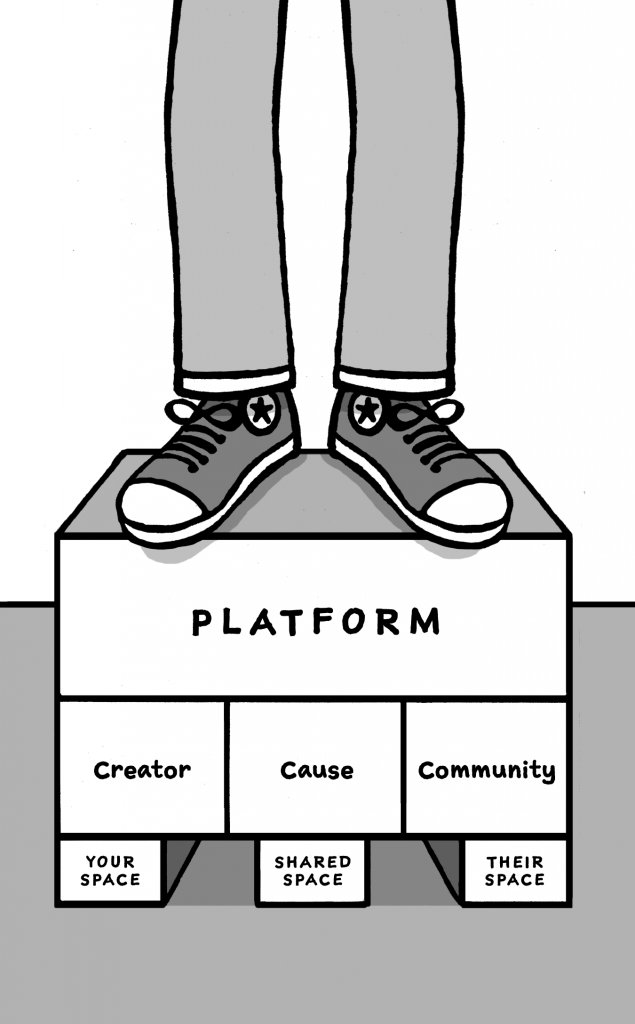Great ideas are no longer enough. Without a platform—something that enables you to get seen and heard—you don’t have a chance. —Michael Hyatt
Talent Is No Longer Enough
On a January morning, a musical genius stood in a metro station in Washington, DC, and started to play the violin. The violin he used cost 3.5 million dollars.
According to his article in the Washington Post, staff writer Gene Weingarten reported “the violinist played six pieces; in total about forty-five minutes. Because of rush hour, over one thousand people went through the station, most of them on their way to work.
- After the first three minutes went by, a middle aged man noticed the musician playing. He slowed his pace, stopped for a few seconds, and then hurried off to work.
- A minute later, the violinist received his first dollar tip: a woman placed her money down and continued to walk without stopping.
- A few minutes later, someone leaned against the wall to listen to him, but the man looked at his watch and started to walk again. Clearly his work called him away.
The one who paid the most attention was a three-year-old boy.
His mother pulled him along, but the child stopped to look at the violinist. Finally the mother pushed hard, blocking his line of sight as they walked away. Persistently, the child fought for a glimpse, but without success. This action was repeated by several other children. All the parents, without exception, forced them to move on.
In the forty-five minutes the musician played, only seven people stopped and stayed for at least one minute. Twenty-seven people gave him money but continued to walk their normal pace. He collected thirty-two dollars. (Typically his talents command a thousand dollars a minute, not 71 cents.)
When he finished playing and silence took over, no one noticed it. No one applauded.
Only one woman recognized the identity of the violinist playing that morning—Joshua Bell, one of the best musicians in the world. “Three days before his subway station performance, Bell played to a full house at Boston’s stately Symphony Hall, where average seats went for $100. Two weeks later, at the Music Center at Strathmore, in North Bethesda, he would play to a standing-room-only audience so respectful of his artistry that they stifled their coughs until the silence between movements.”
The Washington Post organized this “incognito concert” as part of a social experiment. I retell this story because it illustrates your desperate need for a platform.
Joshua Bell’s talent didn’t change that cold January morning. He didn’t hold back or skimp for his unappreciative audience.
Despite his best attempts, no one heard his music, because no one saw his talent. He lacked one thing—a platform. (Share on Twitter| Facebook |Google+ | LinkedIn)
(Watch video experiment below or here.)
Without a Platform You Won’t Stand
In the past, you simply needed a great product. Word of mouth marketing spread the news and then your business grew. Today, a great product is only the baseline. Without it you won’t survive. But as with Joshua Bell in the crowded subway, a great product is no longer enough. You now need a platform.
(I owe much of what I know about Platforms to one of my mentors—Michael Hyatt.)
In the old days, people would stand on “soapboxes” and communicate their message. These raised platforms were often wooden crates originally used for shipment of soap or other dry goods from a manufacturer to a retail store. “Soapboxes” functioned as inexpensive and portable temporary platforms for street corner speakers attempting to be seen and heard at improvised outdoor meetings. (A little less convenient than Twitter.)
Today, such “soapbox” strategies only prove ineffective and annoying. Marketers classify this as “interruption marketing.” This marketing often creates ill feelings rather than good will.
Interruption Marketing? Get a Clue!
According to Seth Godin:
Interruption marketing is communicating messages that interrupt customers while they are doing something of their preference. Examples include advertisements on television and radio.
Most businesses prefer interruption marketing because it’s faster, easier, and cheaper. Examples include:
- Purchasing email lists
- Spamming (illegal)
- Running ads
- Placing flyers on windshields
- Delivering free community papers to your door
Unfortunately, this type of marketing doesn’t work in the long run. Here’s why. Think of the internet as one big, noisy room. If you’re on social media you already hear your friends and families friends “talking” to you regularly. They say:
- LIKE this
- RT that
- SHARE my pic
- COMMENT on my update
Although you love them, because of the sheer volume, their noise can be deafening. Besides the voices you want to hear, you also hear endless businesses shouting from their soapboxes:
- SPECIAL OFFER
- LIMITED TIME ONLY
- BONUS INCLUDED
- ACT NOW
- BUY ON CREDIT
- NEW AND IMPROVED
Naturally, you tune out these interruptions. Think of it as someone standing on the street corner screaming out their marriage proposals to passersby. You end up resenting those businesses.
- You see right through it.
- You sniff out their desire for a quick sale.
- You know these businesses don’t truly care about you.
Permission marketing is different.
Permission Marketing? Get Going!
According to Seth Godin:
Permission marketing is the privilege (not the right) of delivering anticipated, personal and relevant messages to people who actually want to get them. Real permission is different from presumed or legalistic permission. Just because you somehow get my email address doesn’t mean you have permission. Just because I don’t complain doesn’t mean you have permission. Just because it’s in the fine print of your privacy policy doesn’t mean it’s permission either. Real permission works like this: if you stop showing up, people complain, they ask where you went.
In today’s marketplace, permission marketing works much better. Think of it as a relationship built slowly over time. This takes patience and humility.
- You defer your “ask” until later.
- You give with no strings attached.
- You care about your customers by valuing their time.
Introducing the Simple Platform Plan
So how do you get a strong platform? And how do you build your brand and your business around permission marketing rather than interruption marketing?
On November 14-15 at the Igniting Souls Conference I’m investing 2 days helping a small group of people do just that. Together we’ll learn how to apply the Simple Platform Plan in your context. You’ll learn how to get seen and heard. Although we don’t have time for a deep dive here (this post is already over 1000 words) I’ll share the Simple Platform Plan illustration below.
If you want to secure your spot at the Igniting Souls Conference, grab your Early Bird ticket today and use the extra $100 off code below.
(Illustration credit to Mike Rohde, illustrator of Day Job to Dream Job).
————————————————————
Igniting Souls Conference
2:45 PM – Session 4 : I AM A COMMUNICATOR AND I NEED A PLATFORM
How do you get noticed in a noisy world? If you can’t be seen, then you won’t be heard. Discover the 3 ways to get a platform and the pros and cons of each strategy. Even better, begin creating yours with our simple platform plan.
Full schedule here. Early bird tickets available UNTIL OCTOBER 14. Subscribers use IGNITER100 at checkout to get an additional $100 off for a limited time.
Read more about the other sessions below:
- Session 1 — I am a soul and I have a story
- Session 2 — I am a guru and I have a solution
- Session 3 — I am a communicator and I need a platform
- Sessions 5-9 — Full Description
Simple Platform Plan
from Day Job to Dream Job


Kary, this is such a great article! I’m an emotional person so great with my product (writing) but awful at the business side of things so thank you for breaking down some of the marketing ploys out there and which ones do and don’t work!! Definitely food for thought 🙂
@reclaimfutures:disqus you bet. Anything you need let me know. I have some more helpful posts in this series. Enjoy.